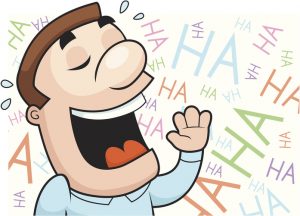 Who doesn’t love a good joke? If such a killjoy exists, I have not had the displeasure of making their acquaintance. Jokes, whether they be puns, limericks, lawyer-shamers, slapstick, plays on word, or of the venerable knock-knock variety, have long been a mainstay of human communication, and a creative way to prove ourselves companionable to others out in the wilds of society.
Who doesn’t love a good joke? If such a killjoy exists, I have not had the displeasure of making their acquaintance. Jokes, whether they be puns, limericks, lawyer-shamers, slapstick, plays on word, or of the venerable knock-knock variety, have long been a mainstay of human communication, and a creative way to prove ourselves companionable to others out in the wilds of society.
A large chunk of the universe of jokes exists in the stream of oral tradition; revised, honed, updated, and polished as one generation passes the gag on to the next. These time-varnished bits were created in times immemorial, and those responsible for their creation are lost to the winds of time. As a result, most of these dusty jokes float along, untouched by the long arm of the law.
But, there exist other, timelier gags that do indeed enjoy the privilege of copyright protection. While the Copyright Act does not cover short phrases, which are more suitable for trademark protection, it does cover pithy literary works. So, while a phrase like “Just Do It” can be protected by trademark law, it does not enjoy copyright protection. But a particularly cutting lawyer joke, assuming it is original and “fixed in a tangible medium of expression,” as required by the Copyright Act, certainly does.

Humans in the Loop: The People Powering Trusted Legal AI
As the use of artificial intelligence permeates legal practice, a critical question confronts every legal professional who uses these tools: Can I trust this?
Copyright protection is a desired and beneficial thing for those that trade in riffs and yucks. Indeed, there are few places in the creative arts universe where stealing from your contemporaries is more frowned upon than in the world of comedy. When the call of “joke thief’ rings out in a crowded comedy club or online, there is indeed no more extreme a shot that can be be fired.
And while these disputes are usually resolved through fisticuffs or in the vape-smoke-filled back rooms of comedy clubs or over a few skinny margaritas at the bar, they, on rare occasion, find their way into courts of law.
Like have you heard the one about Abbott & Costello and the recent onstage aping of their iconic (if lacking in edge) “Who’s on First?” routine? In the TCA Television case, that baseball-centric bit, which first aired in 1938 as part of something called the The Kate Smith Hour, was front and center. The producers of the theatrical play at issue, which was entitled Hand of God and staged somewhere far, far off-Broadway, decided to incorporate a barely altered version of the original A&C routine into the play’s narrative. The court ruled that the routine was sufficiently original to be protected by copyright. And the usage in Hand of God, which consisted of a recitation of the routine by a foul-mouthed sock puppet, and not just any sock puppet, but one that was most likely possessed by Satan, may have been edgy, but was found not to be a fair use of the material. Score one for comedians.
Then there’s the one about the denim don, Jeff Foxworthy. While his comedy may not be of the highest brow, his legal maneuvering evinces polish. A company tried to make a quick buck by selling shirts emblazoned with a selection of the Fox’s most hilarious riffs about the different ways one is able to ascertain whether or not one falls within the purview of a certain Southern stereotype.

Transform Legal Reasoning Into Business-Ready Results With General AI
Protégé™ General AI is fundamentally changing how legal professionals use AI in their everyday practice.
The issue of whether his “You might be a redneck, if [fill in the blank]” riffs were subject to protection was raised in the case, and the court concluded that they most certainly were. The court’s nuanced analysis cited to some insight from the comedian that illustrated that the generally pithy nature of jokes does not indicate a lack of creativity, but a painstaking creative process:
A joke is […] a strange thing. And probably to the public, they never realize this. But I have — with a comic, we all have the same bowl of words to work with, and the whole trick is to take the smallest amount of words and put them in the proper order. You know, I’ve sat backstage with Jay Leno or Gary Shandling and sometimes for ten or fifteen minutes argued about a particular one line in a joke, which word should go where, should you delete this, which word should go to the end of the joke[…]
That is to say, a joke being short doesn’t mean that it is not creative – in fact, the opposite is often the case. And while the entire bowl of words is not subject to copyright protection, the selection and arrangement of those words is protectable.
Against this backdrop, a comedian with a presence on the pithiest platform of them all, Twitter, has brought a case against Conan O’Brien and his team of late-show writers for allegedly pilfering a number of jokes he originally published via tweet. The comedian previously had many of his gags used in magazines and newspapers and late night shows, and closely followed the comedy scene. But, as Judge Janis L. Sammartino noted, “the laughter stopped in late 2014 and early 2015, at least for a spell, when Plaintiff began to notice similarities between his posts and several of the jokes” that O’Brien performed on his show.
While the actual jokes at issue in the case are not that important (or funny), they are creative and fixed (a tweet counts), and the timeline – which reflects that multiple of the plaintiff’s jokes were posted online just before they appeared in a slightly different form on O’Brien’s show – is fairly damning.
There are those who feel that O’Brien hit his creative peak when he penned the classic episode for The Simpsons in which the titular family’s hometown of Springfield is plagued by its decision to build a monorail, but O’Brien’s status as an affable and established comedian may still affect a jury tasked with deciding whether someone in his position would stoop to stealing jokes. For his part, O’Brien claims that his staff independently created the jokes and, as we learned from Foxworthy above, it is common for multiple comedians typing at multiple keyboards to come up with the same bit, albeit in different word combinations of varying effectiveness. Given the ignominy that attaches to those judged to be joke thieves, it is no surprise that O’Brien and Co. are fighting these claims to the last. With trial set to commence in the very near future, it soon will become evident which side will have that coveted last laugh.